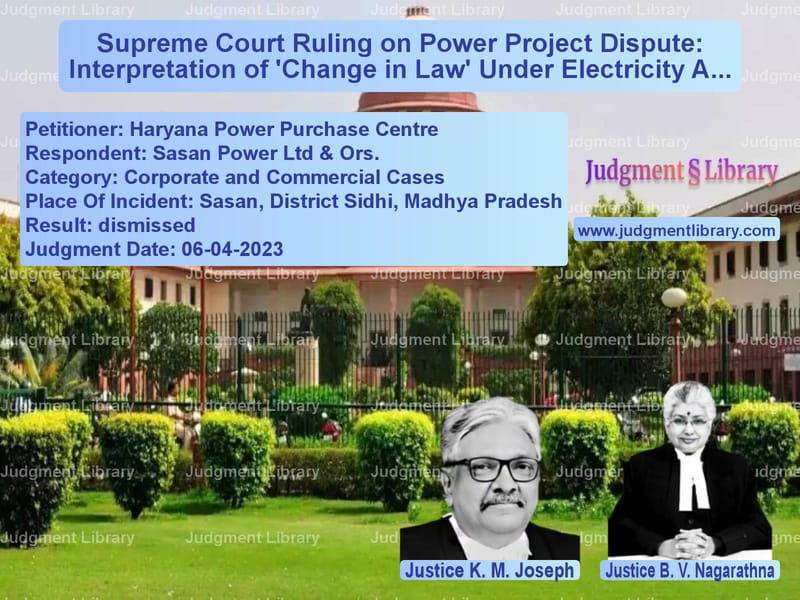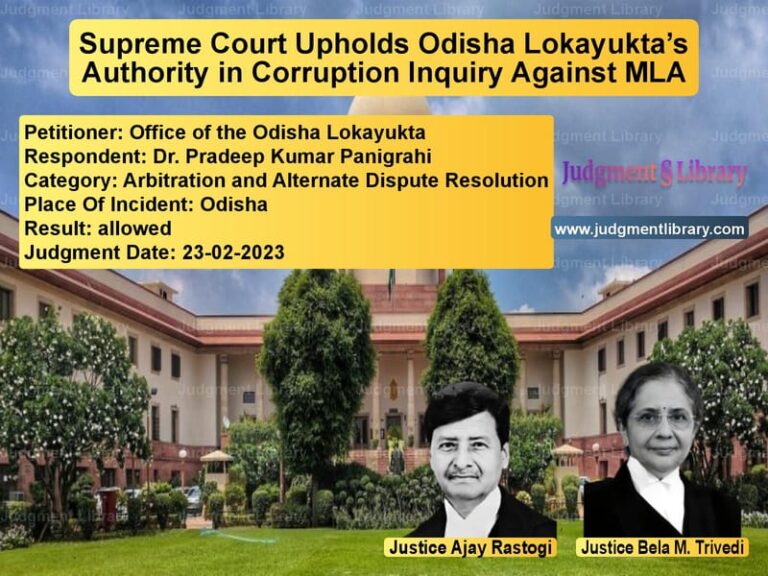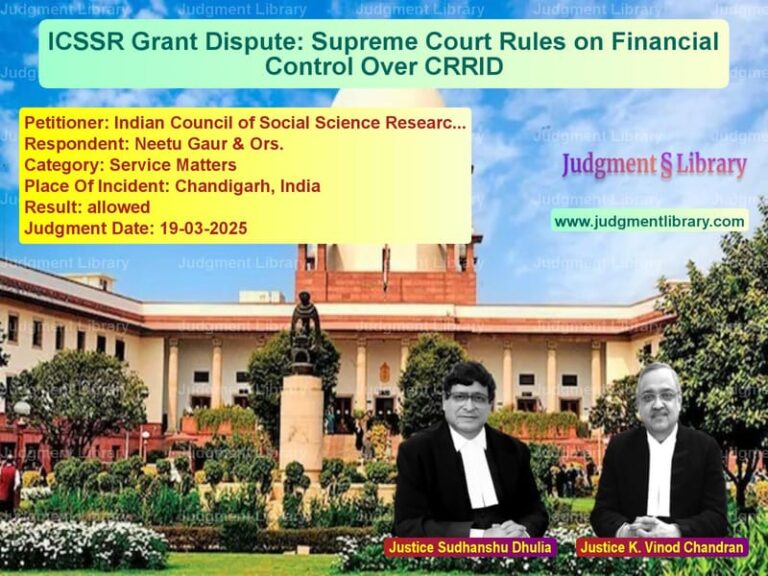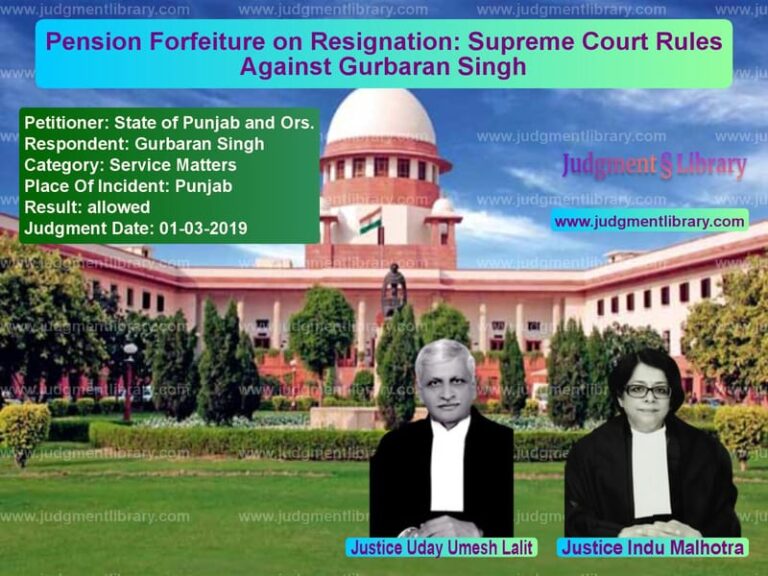Supreme Court Ruling on Power Project Dispute: Interpretation of ‘Change in Law’ Under Electricity Act
The case between Haryana Power Purchase Centre and Sasan Power Ltd. revolves around the legal interpretation of the term ‘Change in Law’ under the Power Purchase Agreement (PPA). The dispute arose due to increased project costs concerning the water intake system and the imposition of customs duty on imported mining equipment. The Supreme Court’s judgment clarified key principles governing infrastructure contracts and regulatory policies in power projects.
The primary question before the Supreme Court was whether these additional costs incurred by Sasan Power Ltd. could be claimed as a ‘Change in Law’ under the PPA and whether the tribunal’s order granting relief was justified.
Background of the Case
The case was initially filed before the Central Electricity Regulatory Commission (CERC) and later heard by the Appellate Tribunal for Electricity (APTEL). The appellant, Haryana Power Purchase Centre, contested the financial relief granted to Sasan Power Ltd. concerning increased costs in the construction and operation of an ultra mega power project (UMPP).
Key Issues in the Case
- Whether the change in location of the water intake system constitutes a ‘Change in Law’ under the PPA.
- Whether the imposition of customs duty on imported mining equipment falls under the definition of ‘Change in Law.’
- The legal standing of disclaimers included in the bidding documents regarding project feasibility.
- The jurisdiction of the regulatory bodies in granting relief beyond contractual terms.
Petitioner’s Arguments
The petitioner, Haryana Power Purchase Centre, contended that Sasan Power Ltd. was attempting to shift its financial burden onto the procurers under the guise of ‘Change in Law.’ Their arguments were as follows:
Water Intake System
- The original feasibility report prepared by WAPCOS suggested a specific water intake location, but later reports indicated that the location was unsuitable.
- The responsibility for assessing the viability of the water intake location lay solely with Sasan Power Ltd.
- The PPA clearly stated that the project developer bore the risk of such cost escalations, and it was not the responsibility of the procurers.
- Disclaimers in the bidding documents placed the responsibility for due diligence on the bidder.
Customs Duty on Mining Equipment
- The customs duty exemption for ultra mega power projects (UMPPs) applied only to power generation equipment, not to mining equipment.
- The exemption was never granted for mining equipment, and the petitioner failed to establish that it was in place at the time of bidding.
- The government’s office memorandum clarifying the applicability of customs duty did not constitute a new law but merely reiterated the existing policy.
Respondent’s Arguments
The respondent, Sasan Power Ltd., argued that the increased costs resulted from regulatory and statutory changes beyond their control, qualifying them for compensation under ‘Change in Law.’
Water Intake System
- The initial report provided by WAPCOS formed the basis for project planning and financing.
- The change in the water intake location was necessitated by regulatory and environmental considerations imposed after the project had already commenced.
- Since the cost escalation was unforeseen and imposed by external agencies, it should qualify as a ‘Change in Law’ event.
Customs Duty on Mining Equipment
- At the time of bidding, mining equipment was exempt from customs duty.
- The subsequent imposition of customs duty led to an unexpected increase in project costs.
- The PPA’s ‘Change in Law’ clause covered unforeseen statutory changes affecting project costs, and thus, the procurers were liable to compensate for the increased expense.
Supreme Court’s Observations
The Supreme Court examined whether the changes cited by Sasan Power Ltd. qualified as ‘Change in Law’ under the terms of the PPA.
On the Water Intake System
The Court ruled that:
- The PPA imposed the responsibility of due diligence on the bidder.
- The project developer had the obligation to verify the feasibility of the location before bidding.
- The contract’s disclaimer clauses absolved the procurers from liability for errors in the initial WAPCOS report.
- The tribunal’s decision to grant compensation exceeded its jurisdiction.
On the Customs Duty Issue
The Supreme Court found that:
- The exemption for UMPP projects applied only to power generation equipment.
- There was no evidence that mining equipment had been exempt from customs duty at the time of bidding.
- The office memorandum did not constitute a new law but a clarification of existing policy.
Final Judgment
The Supreme Court ruled in favor of Haryana Power Purchase Centre and held:
- Sasan Power Ltd. was not entitled to compensation for the increased cost of the water intake system.
- The customs duty on mining equipment did not qualify as a ‘Change in Law.’
- The tribunal’s order was invalidated, and the relief granted was quashed.
Key Takeaways from the Judgment
- ‘Change in Law’ claims must be based on statutory amendments or regulatory impositions beyond the control of the developer.
- Contractual disclaimers regarding project feasibility and due diligence are binding on bidders.
- The regulatory commissions must operate within the framework of the PPA and cannot grant relief that contradicts contractual terms.
- Cost escalations due to project miscalculations or feasibility errors do not qualify for compensation under ‘Change in Law.’
Implications of the Ruling
The Supreme Court’s ruling has significant implications for infrastructure and power sector contracts:
- For Developers: Bidders must exercise due diligence before submitting project proposals. Any errors in feasibility studies cannot be shifted to procurers.
- For Procurers: The judgment reaffirms that procurement contracts must be adhered to strictly, ensuring that developers cannot seek relief for anticipated risks.
- For Regulatory Commissions: The decision limits the scope of regulatory bodies in awarding compensation beyond the terms of the contract.
Conclusion
The Supreme Court’s decision in Haryana Power Purchase Centre v. Sasan Power Ltd. provides much-needed clarity on the interpretation of ‘Change in Law’ under the Electricity Act. By emphasizing contractual obligations and the limitations of regulatory relief, the ruling sets a strong precedent for future power sector disputes.
Read also: https://judgmentlibrary.com/supreme-court-quashes-re-investigation-order-in-insurance-bribery-case/
Petitioner Name: Haryana Power Purchase Centre.Respondent Name: Sasan Power Ltd & Ors..Judgment By: Justice K. M. Joseph, Justice B. V. Nagarathna.Place Of Incident: Sasan, District Sidhi, Madhya Pradesh.Judgment Date: 06-04-2023.
Don’t miss out on the full details! Download the complete judgment in PDF format below and gain valuable insights instantly!
Download Judgment: haryana-power-purcha-vs-sasan-power-ltd-&-or-supreme-court-of-india-judgment-dated-06-04-2023.pdf
Directly Download Judgment: Directly download this Judgment
See all petitions in Company Law
See all petitions in Corporate Compliance
See all petitions in Contract Disputes
See all petitions in Damages and Compensation
See all petitions in unfair trade practices
See all petitions in Judgment by K.M. Joseph
See all petitions in Judgment by B.V. Nagarathna
See all petitions in dismissed
See all petitions in supreme court of India judgments April 2023
See all petitions in 2023 judgments
See all posts in Corporate and Commercial Cases Category
See all allowed petitions in Corporate and Commercial Cases Category
See all Dismissed petitions in Corporate and Commercial Cases Category
See all partially allowed petitions in Corporate and Commercial Cases Category







